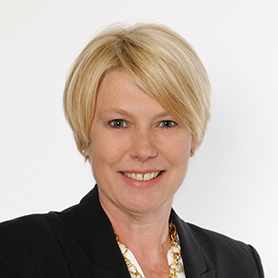Cathy Johnson: Powerful Tools to Implement Change
Cathy Johnson, Director, Industries at dss+ Europe, explains her reasons for championing the dss+ initiative to celebrate International Women’s Day. Plus, why under-the-radar networks and small nudges can be powerful tools to implement change.


Cathy Johnson
Director, Industries. dss+ Europe
Q.
This is the second year dss+ has celebrated the achievements of women in business in honour of International Women's Day. What motivated you to become Ambassador of this year's programme?
Recognising and nurturing different voices in business is increasingly essential to improve the business culture and deepen the pool of talent organisations can dip into. I already have a voice, so it made sense to me to kickstart this year's initiative to put a spotlight on the fantastic achievements of women in leadership roles and emphasise the challenges they experience in an often high-pressured environment. Whether it's safety, sustainability or operations, getting the right business culture in place is an integral part of what dss+ does for its clients, so an initiative that ultimately supports that aim is appealing. While organisations still face several challenges in encouraging and integrating a broader range of voices, initiatives to celebrate International Women's Day is a great way to highlight those challenges and get the conversation started.
Q.
How does your professional journey reflect these views, and what lessons can you pass on to others looking to find their feet in their chosen careers?
Despite being from a village in the northwest of England, my initial career plan was a very ambitious one; to become an investment banker in Frankfurt. At the time, I didn't even know what an investment banker did. But I did know that I wanted to learn German, live abroad and that Frankfurt was a major financial centre. So my career choice seemed to fit the bill. I went on to university to do a degree in banking and German. During the degree, I hit a significant hurdle; my maths capabilities and interests were not strong enough. I converted to a German degree, which suited my strengths much better. Complementing it with additional business studies, I also learned that the broader, more strategic side of business and change management fascinated me, and I quickly completed an MBA. When I look back at the path I took, there wasn't the specific knowledge or career support to guide me on the full range of choices available. So I made my own decisions for better or worse. While today's generation has a lot more career support available, I think the key lesson I would pass on is to recognise your strengths and not be afraid of changing direction, particularly if the path you are on is making you unhappy. Nor should having the confidence to change direction while in education or the workplace be seen as a failure. It should be encouraged as a successful move in the right direction.
"While organisations still face several challenges in encouraging and integrating a broader range of voices, initiatives to celebrate International Women's Day are a great way to highlight those challenges and get the conversation started."
Q.
What inspires you most about working with organisations and, for those looking to take on a strategic operational role in business, what would you say are the critical skillsets?
For a strategic operational role at the top level you need to have an eye for when something is working and when it is not. You also need to have confidence in your ability to make key decisions; what's the root cause of the problem, and what solutions can you put in place? Importantly, how do you implement those solutions? I get a big kick when we reach the stage of translating a well-formulated strategy into reality. It's like being a snowplough forging a clear path ahead and then inspiring people to follow the vision you have created. For me, it's not about helping organisations maintain the status quo. On the contrary, I always look to challenge and explore a better way of doing something. It's exciting to be involved in shaping an organisation's future, but to initiate real change and drive action I believe you've got to develop business continually, you've got to develop teams, and you've got to develop yourself.
Q.
You talk about initiating real change, so what do you think are the main stumbling blocks to achieving a shift in business culture, and what would you do to rectify it?
Firstly, we have to give people the confidence to be themselves throughout their careers. Some people can easily give 110% to their role; others need a better work-life balance to fulfil their potential. Also, while it's good to celebrate professional achievements, we often measure success by how far we climb up the management ladder. But what happens when you reach the top of where you want to be? A large part of professional growth is getting the support you need to learn from mistakes and recognise your strengths. Yet as you rise to the top, these support systems are often reduced, and failure is no longer seen as an option. As a result, organisations can unconsciously encourage a more opaque leadership style. So I think if we want to impact business culture for good, there needs to be more recognition that support, continual learning and development are essential at the top level and across the business ecosystem. Developing a less linear management structure that offers different ways to progress or explore sideways moves can unlock hidden talent and help create a healthier business culture overall. Plus, it would be an attractive proposition to external candidates - both men and women - who increasingly look for a more sustainable way to achieve their career ambitions.
"Think about implementing small but continuous changes to make an impact. This approach is often more powerful than going out with all guns blazing to make significant changes quickly."
Q.
In honour of International Women's Day, what are your key words of advice for women looking to break through professional barrier?
I think staying true to your values is vital. Trying to shoehorn yourself into an environment and be something you are not can be a recipe for misery and failure. However, if you have the confidence, ability and support around you to change a business environment for the better, then go for it. Think about implementing small but continuous changes to make an impact. This approach is often more powerful than going out with all guns blazing to make significant changes quickly. I call this the nudge culture, which uses all the good people around you with a shared vision to help impact sustainable change. Performance is critical, whether it's better safety, improving sustainability targets or higher productivity, but people's actions and behaviours are the real keys to improving performance. Also, we are encouraged to seek out new role models or appoint mentors to help overcome professional hurdles. But don't overlook what I call 'sponsors'; these are the people who have supported and given you opportunities over the years. They are often under-the-radar networks of old school friends or ex-colleagues often working in positions of power externally, but are always on hand to act as sounding boards. We can only break barriers by supporting each other's goals in a consistent and non-judgmental way that change can truly happen.